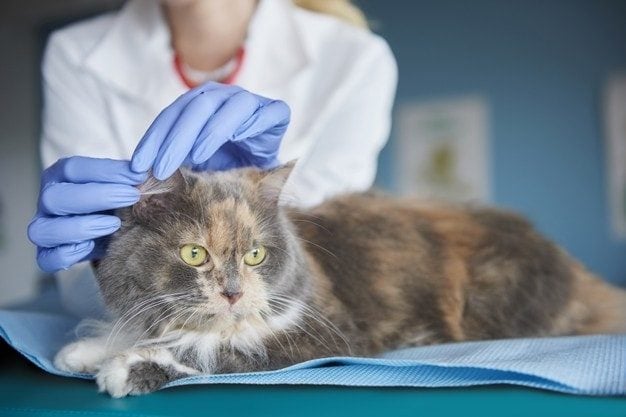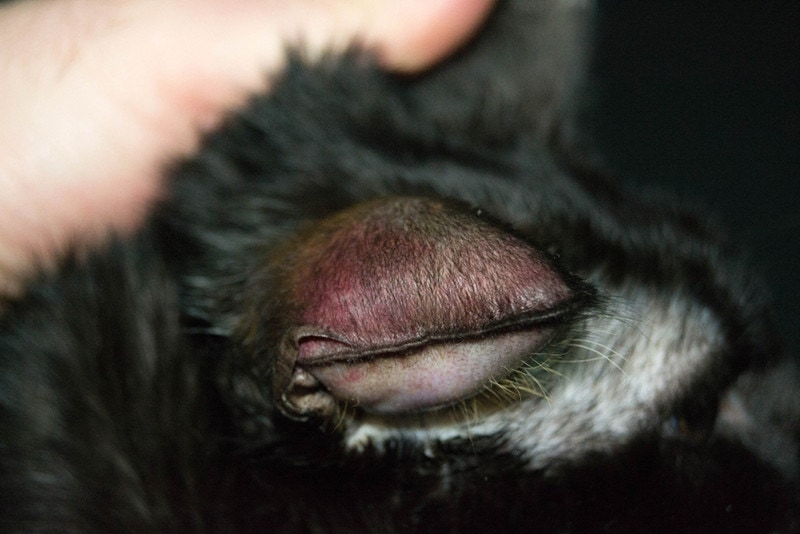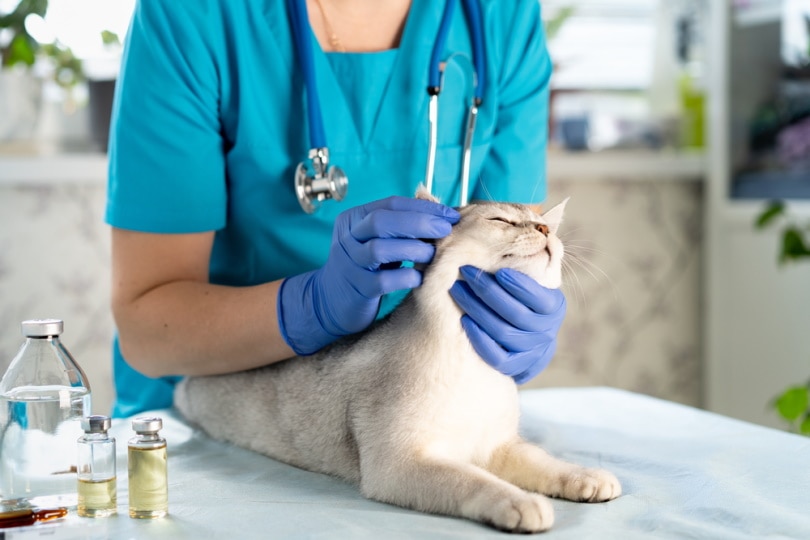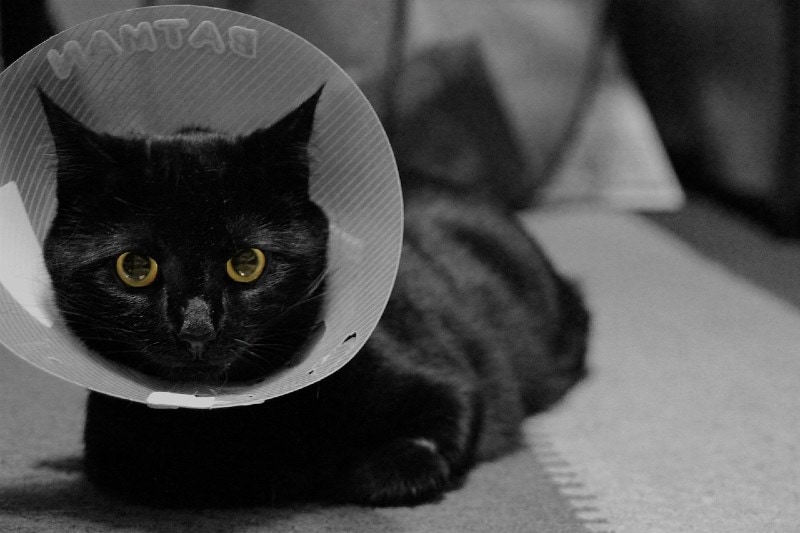Aural Hematomas in Cats: What Should I Look For? Vet-Approved Care & FAQ
Updated on

As a cat parent, you may not realize that several delicate blood vessels are running through your cat’s ear flaps. These same blood vessels can sometimes swell and rupture, for example when your cat is constantly scratching itself. Some of the blood that normally runs within the vessels will exit through the rupture and remain trapped within the ear tissues, skin, and cartilage, causing a hematoma to develop. An ear hematoma is known as an aural hematoma.
If you suspect your cat has an aural hematoma, you must make an appointment with your vet. It is possible that the condition could go away on its own, but it is painful, and if it doesn’t heal itself, it can lead to your feline needing surgery.
So, what should you look for if you think your feline pal has an aural hematoma? We’ll answer that question and more below.
 What Is An Aural Hematoma?
What Is An Aural Hematoma?
An aural hematoma and a cat ear hematoma are the same. When a blood vessel in your cat’s ears bursts, the space between the ear cartilage becomes filled with blood. This leads to swelling and a full pocket of blood collected in your cat’s ear flap.
These types of hematomas don’t happen often, but sometimes they can require surgery, so if your cat has an aural hematoma, it’s best to take him to the vet to be safe.

What Are the Signs of an Aural Hematoma?
Aural hematomas usually develop on the underside of your cat’s ear. The sacks can be small or big enough to affect the whole ear. Only one ear may be affected, but it can also involve both ears.
The swelling will be movable and soft in most cases. It could also be inflamed, red, and painful. Here are a few signs to watch for if you think your cat has an aural hematoma.
- Scratching at his ears
- Shaking his head
- Tilting his head
- Pain in his ear
- Ear discharge
- Odor coming from the ear
- Red, swollen, and ulcerated pinna
- Inflamed, dirty ear canals
What Are the Causes of Aural Hematomas?

Now that you know the signs of an aural hematoma in your cat to be on the lookout for, you might wonder just how a cat ends up with the condition. The most common way a cat develops an aural hematoma is by trauma from head shaking or scratching. The second most common is otitis externa, which is an external ear inflammation due to an ear infection.
When your feline has an ear infection, the constant scratching could make it prone to develop into an aural hematoma. However, there are other causes of aural hematomas in cats besides head shaking, scratching, and ear infections.
- Ear mites (mostly found in kittens and outdoor cats)
- Foreign materials, polyps, or a type of cancer that leads to otitis externa
- Injuries from getting into fights or being bitten
- Cushing’s Disease or another condition that causes fragile blood vessels
Your vet should be able to tell you what caused your cat’s condition and help with a treatment plan.
How Do I Care for a Cat with an Aural Hematoma?
When you notice the signs of an aural hematoma in your cat, it’s essential to get the cat to the vet as soon as possible for diagnosis and treatment. Your vet will let you know how they want to go forward with treating your cat.

If your cat must have surgery, post-surgical care at home will keep your cat comfortable and prevent the area from swelling again. Some essential tips to use when caring for your cat after this surgery include the following:
- Keep your cat’s ears clean in the way the vet directs you to
- If your vet attaches a cone or collar after surgery, ensure that the cat wears it at all times.
- While your cat’s ear is going to bleed a little, if the bleeding becomes heavier, contact your vet
- Keep an eye on your cat ears for increased swelling, redness, or pain
- Make sure your cat takes the medicine at the same time every day
- Pamper, love, and give your cat treats whenever needed
In most cases, a cat recovering from an aural hematoma will be better within a week or two at the most. If you notice that your cat isn’t getting better, you need to make an appointment with your vet immediately. It’s also essential to give your cat a safe, quiet space to recover. Try putting him in a room without much foot traffic so he can get the rest he needs. Make sure to provide his bed, food, water, and any of his favorite toys, as well as your companionship and love.
Frequently Asked Questions
Now that you know quite a bit about aural hematomas and what to look for in your cat, we’ll answer a few of your most common questions below.
Will an Aural Hematoma Go Away on its Own?
It is possible that your vet won’t recommend anything for your cat’s aural hematoma. This is only if the hematoma is small, painless, and not causing your cat a problem. In many cases, the hematoma will go away on its own. However, if the area becomes painful, it’s best to seek attention for your cat from your vet right away.

What Is the Treatment for an Aural Hematoma?
According to his diagnosis, the vet will recommend a treatment plan. Usually, if the hematoma is severe, there will be surgery to drain the fluid that is causing the swelling and possibly a plan to treat the underlying cause of the issue as well.
Conclusion
Aural hematomas in cats don’t always require surgery, though it is best to contact your vet if you think your pet has the condition. If your cat requires surgery, make sure to follow all of the directions given to you by your vet until your cat is happy, healthy, and aural hematoma-free. Setting up a stress-free recovery room is an excellent way to welcome your cat home.
See also:
Featured Image Credit: Freepik

 What Is An Aural Hematoma?
What Is An Aural Hematoma?









